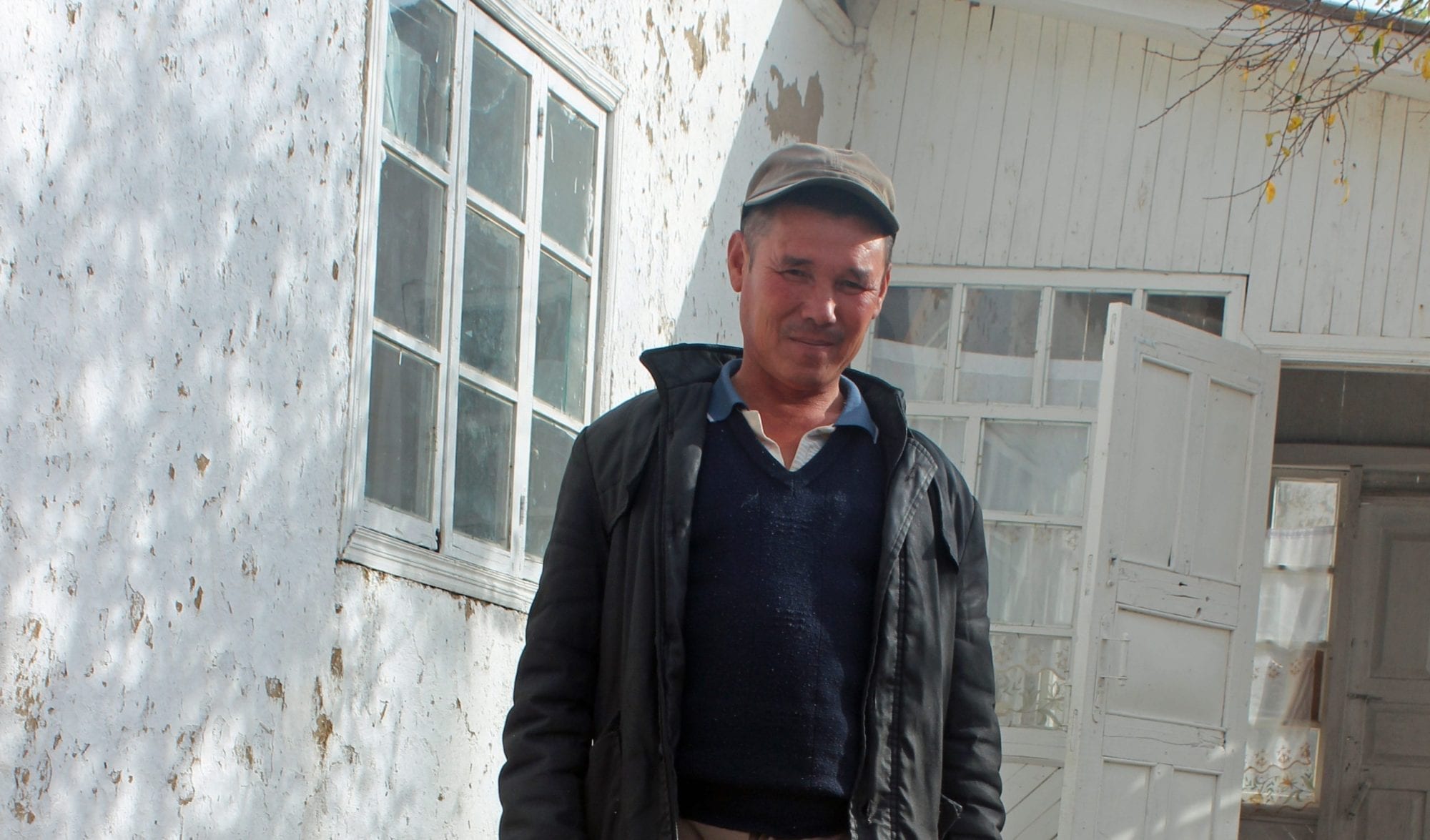
Jul 27, 2018
Aldaberdi Karimov, 42, who lives in a remote Kyrgyzstan village in the Batken region, did not want to migrate from his country to find work to support his family, including his daughter, Ak Maral, now 5 years old.
But like many in Kyrgyzstan, where remittances from workers abroad make up more than 25 percent of the country’s gross domestic product, Karimov faced the heart-wrenching decision to leave his family to find employment. In fact, so few good jobs are available in the country, especially for workers in rural areas, only 24 percent of Kyrgyz workers are employed in the formal economy.
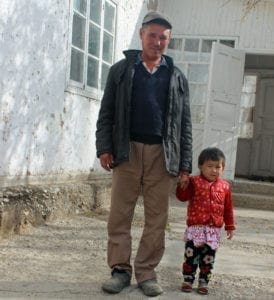
Aldaberdi Karimov escaped from forced labor and is back in his Kyrgyz village with his family, including his daughter, Ak Maral. Credit: Solidarity Center
And when he left his village, Karimov had no idea he would be a target of force labor and human trafficking. Globally, more than 21 million people are in forced labor, according to the International Labor Organization, which on July 30 marks World Day against Trafficking in Persons.
Forced to Live with Cows in the Barn
Karimov first sought jobs in Russia and then migrated to Kazakhstan, where he worked as a market vendor in Almaty, Kazakhstan’s largest city. Karimov thought he would fare better in Kazakhstan because, like Kyrgyzstan, it is a member of the Eurasian Economic Union.
Between 100,000 to 150,000 Kyrgyz were registered in Kazakhstan at the end of 2017, figures that do not reflect many who are not registered, according to a new report by the International Federation for Human Rights (FIDH). Most work without written contracts or on contracts that do not adequately protect their rights. Their passports typically are confiscated by employers, making it difficult for them to leave abusive jobs, and they have no access to labor protections like safe working conditions and paid leave.
Karimov could not afford the permit needed to sell goods legally in Kazakhstan—costing between $1,500 and $2,000, a permit is the equivalent of a year’s wage. Through an intermediary, he and his brother, Giyazidin, were led to a job on a Kazakh farm in June 2016 tending 100 cows and 2,000 sheep. The farmer said he would pay them 40,000 tenge ($117) each per month.
“The employer promised to pay us not every month, but once every three or four months,” Karimov says. “After three months, we asked for an advance and our employer became very angry and said that the cows and sheep are very thin, so he is not going to pay yet.”
By October, they each had been paid only $100 for six months’ work. Frost and cold rains began and when the brothers asked to be housed in a warmer environment than their small thatched hut in the field, the employer told them to live with the cows and rams in the barn.
Tens of Thousands of Workers in Forced Labor in Kazakhstan
Essentially trapped in forced labor, the brothers made their escape after Giyazidin became so ill that the farmer took him to the hospital. Tens of thousands of workers are estimated to be victims of forced labor in Kazakhstan, with migrant workers from Kyrgyzstan, Tajikistan and Uzbekistan forced to labor in agriculture, construction and the extraction industry.
Like many migrant workers, neither Karimov nor his brother reported their abuse to the police because they did not trust them. In fact, officers of law enforcement agencies often are the link between migrant workers and “buyers” of labor, according to the FIDH report.
Karimov says lack of a labor contract and no police protection left him and his brother vulnerable to human traffickers and inhumane working conditions. Around the world, most migrant workers are denied the right to form unions and bargain with their employer—a fundamental freedom that enables abuse and exploitation. “The lack of labor agreements entails forced labor and even slavery,” says Aina Shormanbayeva, president of the Legal Initiative, a Kazakhstan-based public foundation.
Now back in his village, Karimov says migrating for jobs is now out of the question, even as he searches for work, still seeking wages that will enable him to support his family
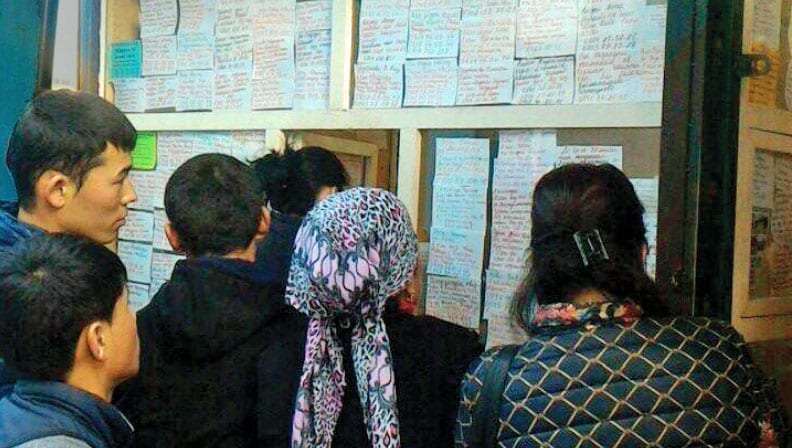
Jul 19, 2018
Workers who migrate from Kyrgyzstan to Kazakhstan for jobs often do not receive their wages, are forced to work in unsafe and abusive conditions and even are kidnapped and held against their will in forced labor, according to a new report.
“Invisible and Exploited in Kazakhstan” also found that children are forced to labor, with young girls between ages 12 and 17 working as nannies, and boys working in markets and on farms. The report is based on the findings of a series of missions by the International Federation for Human Rights (FIDH) and its partners from September to November 2017 in Kyrgyzstan and Kazakhstan. The Solidarity Center contributed extensively to the report.
“The right to freedom of association is a core principle of human rights and worker rights, including when workers are migrating for jobs,” says Lola Abdukadyrova, Solidarity Center program coordinator. Abdukadyrova spoke yesterday at a press conference in Bishkek, Kyrgyzstan, where the report was released.
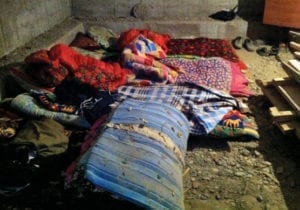
Bedroom of five migrant workers in the basement of a construction site in Kazakhstan, November 2017. Credit: FIDH
Between 100,000 to 150,000 Kyrgyz were registered in Kazakhstan at the end of 2017, figures that do not reflect many who are not registered. Most work without written contracts or on contracts that do not adequately protect their rights. Their passports typically are confiscated, making it difficult for them to leave abusive employers, and they have no access to labor protections like safe working conditions and paid leave.
“The lack of labor agreements entails forced labor and even slavery,” says Aina Shormanbayeva, speaking at the press conference, which drew nearly two dozen reporters. Shormanbayeva is president of the Legal Initiative, a Kazakhstan-based public foundation.
Some 81,600 workers were victims of forced labor in Kazakhstan in 2016, according to estimates by the nonprofit Walk Free Foundation, with migrant workers from Kyrgyzstan, Tajikistan and Uzbekistan forced to labor in agriculture, construction and the extraction industry.
Women Migrant Workers Targets of Gender-Based Violence
While some one-third of all migrants were women two to three years ago, the report finds women now comprise half of migrant workers. Women are especially vulnerable, facing gender-based violence in agricultural fields and in employers’ homes when working as domestic workers. They may lack medical care while pregnant and often are fired when employers learn of their pregnancy.
Says one woman migrant worker: “I work as a janitor from 9 a.m. to 9 p.m., and when there are banquets, until 3 a.m. or 4 a.m. Lunch breaks are 30 minutes maximum. There are no days off. I work every day. Some people can’t prove anything when they don’t get paid because nothing is documented. One woman worked at a car wash, they told her they didn’t have money and so they didn’t pay her. This happens to many people.”
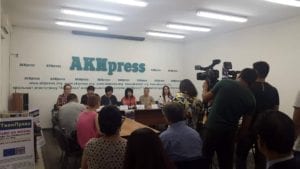
Solidarity Center’s Lola Abdukadyrova, (second from left), discussed the plight of migrant workers in Kazakhstan during a press conference in Bishkek. Credit: Solidarity Center
The report finds migrant workers are not aware of their rights on the job, and they rarely appeal for protection of their rights when their employers perform illegal actions. They also do not believe police are able to protect their rights. In many cases, officers of law enforcement agencies are the link between migrant workers and buyers.
“Kazakhstan has not taken effective measures to prevent, investigate and prosecute persons involved in providing illegal intermediary services, and has not ensured effective legal protection for the victims,” the report states. Kazakh authorities argue that it is not their responsibility to protect migrant workers, and that protection of migrant workers is the responsibility of Akims (heads of regional or local authorities).
Kazakhstan was recently rated one of the 10 worst countries for workers by the International Trade Union Confederation (ITUC). Union leader Larisa Kharkova was sentenced in 2017 to four years of restrictions on her freedom of movement, a ban on holding public office for five years and 100 hours of forced labor on false charges of embezzlement. Kharkova led the Confederation of Independent Trade Unions of Kazakhstan, which was ordered closed by a court ruling. Independent trade unions in Kazakhstan face ongoing attacks on freedom of association and basic trade union rights.
Over the past five years, the Solidarity Center in Kyrgyzstan has worked extensively to advance migrant worker rights, including holding awareness-raising campaigns for potential migrants and their families; supporting a hotline on labor migration issues; and assisting unions in protecting and promoting migrants’ worker rights.
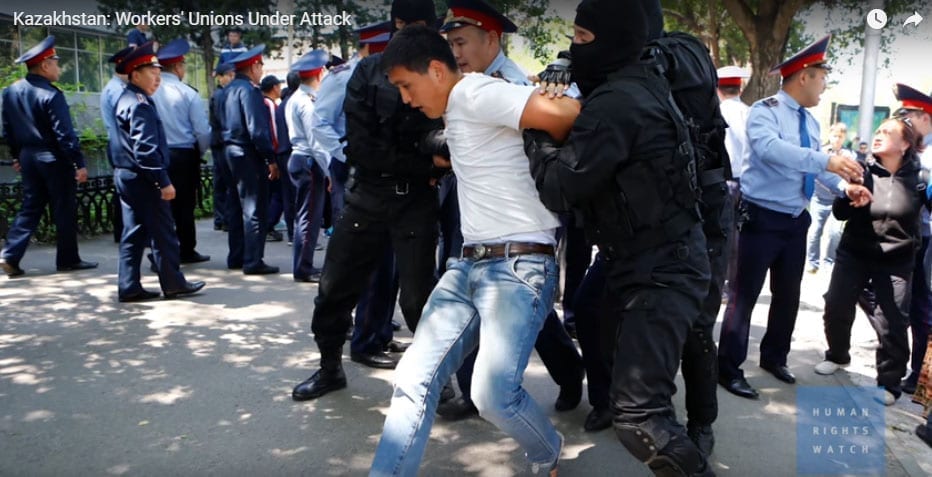
Jul 7, 2017
Two Kazak union leaders who were arrested and imprisoned in January after leading a hunger strike, have been convicted and fined exorbitant amounts for their protest against the government’s liquidation of the Confederation of Independent Trade Unions of Kazakhstan (KNPRK) in favor of a government-aligned federation.
Amin Yeleusinov, chairman of the Oil Construction Company union, was sentenced to two years in prison on politically motivated embezzlement charges and fined $26,300, according to Human Rights Watch. Yeleusinov, 55, is banned from engaging in any trade union activities for five years.
Authorities attempted to make Yeleusinov sign a false confession, and he has fallen ill due to the conditions in his prison cell and the harsh detention regime, according to the International Trade Union Confederation (ITUC).
Nurbek Kushakbayev, KNPRK deputy president, was sentenced to two years prison in a corrective labor colony and fined $80,000. The OCC demanded the fines to pay for “harm” caused to the company. Human rights organizations say the trials were not conducted with due process and evidence acquitting the men was repressed.
(Send an email to management demanding the fines be dropped.)
Kazakhstan’s Attacks on Unions Gains Momentum
Yeleusinov’s conviction is the latest development in an ongoing crackdown on independent labor movement in Kazakhstan, according to Human Rights Watch (HRW), and part of an overall spate of “attacks, harassment and prosecutions as Kazakhstan’s embattled civil society continues to be targeted for exercising fundamental rights.”
The country adopted an onerous trade union law in 2014 that marginalized independent unions in favor of a government-controlled federation. Beginning in 2015, the Kazak government began denying registration of unions in the oil, health, construction, media and education sectors along with regional union bodies, as well as the national independent trade confederation. (See the HRW report on violations of workers’ rights in Kazakhstan.)
Larisa Kharkova, KNPRK chairperson, has been subjected to administrative and judicial harassment since the beginning of this year, and she is now facing what human rights organizations say is a series of trumped-up criminal charges.
‘Foreign Investors Should Recognize Kazakhstan’s Attacks on Workers’
The ITUC has lodged a formal complaint with the International Labor Organization over the union leaders’ imprisonment and over the government’s refusal to recognize the rights of workers to form independent trade unions.
Last month, Kazakhstan hosted an international exposition featuring the theme, “future energy,” a high-profile event expected to draw 3 million visitors, including global wealth leaders. Events like EXPO 2017 “should not distract from the serious human rights problems in Kazakhstan, or from the human costs of the government’s repressive policies,” according to Mihra Rittmann, an HRW researcher in Central Asia.
“Foreign investors–many of whom recognize the importance of upholding international labor standards–should take note that while the government claimed it was creating a better system of social partnerships and modernizing trade unions, the reality is that they decimated Kazakhstan’s independent trade union movement,” says Rittmann.

Dec 16, 2016
Union leaders tell the Solidarity Center that the Kazakhstan government has launched a campaign to intimidate union members and to malign and discredit the Confederation of Independent Trade Unions (CFTUK). In addition, the regime has initiated legal action to liquidate the confederation, while leaving intact a government-aligned federation.
Yet even in the face of threats and danger, union leaders and workers say they vow to hold protests if the CFTUK is dissolved.
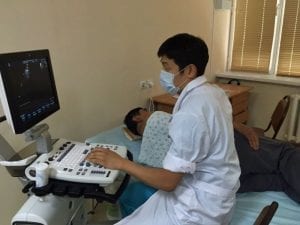
The Kazakhstan government is seeking to dissolve unions of health care workers and others. Credit: Kazinform
The Kazakhstan Ministry of Justice brought a legal challenge before the country’s Economic Court calling for revocation of CNTUK’s registration and its affiliated unions representing health and domestic workers—essentially making union activity illegal.
In a letter, the International Trade Union Confederation (ITUC) denounced the government’s failure to guarantee the right to freedom of association and called on it to withdraw the request before the Economic Court.
A new report also shows Kazakhstan’s new trade union law, adopted after strikes in 2011, has made it more difficult to organize independent unions in the country. “Changes to the labor and criminal codes have contributed to an environment hostile to worker activism,” according to Human Rights Watch, which released the report.
“‘We Are Not The Enemy’: Violations of Workers’ Rights in Kazakhstan” is based on interviews with more than 50 trade union leaders, labor activists and workers across Kazakhstan, and describes harassment, surveillance and, in some cases, spurious legal prosecution or dismissals in apparent retaliation for labor activism.
The International Labor Organization has examined the government’s failure to guarantee the right to freedom of association and in 2015 and again this year urged it to amend laws regarding union registration. The government has not acted on these recommendations.
Dec 16, 2013
The AFL-CIO writes in support of the Confederation of Free Trade Unions of Kazakhstan’s campaign for release of workers imprisoned in December 2011.
Read the full letter.







